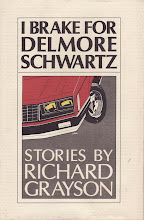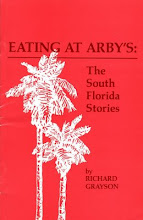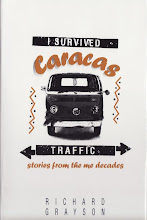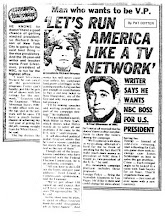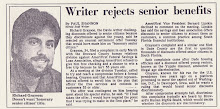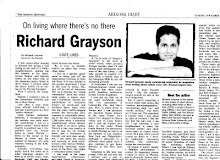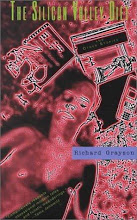
The Cleveland Plain Dealer today has a joint review of Richard Grayson's With Hitler in New York and Jim Harrison's Legends of the Fall:
The Plain Dealer (Cleveland)
Sunday, July 29, 1979
Section G, Page 8
Book Reviews
Two collections of short stories are disappointing
LEGENDS OF THE FALL, by Jim Harrison; Delacorte/Seymour Lawrence, 278 pp., $10.95.
WITH HITLER IN NEW YORK, and Other Stories, by Richard Grayson; Taplinger, 190 pp., $7.95.
By James R. Frakes
About some books you simply hate to say a discouraging word because the author so clearly can write a sentence and hone in on a telling detail. How's this for an opening – "Nordstrom had taken to dancing alone"? How about a man who remembers the year when he stopped finding pennies in his pocket that were older than himself?
But solid fiction is more than a collection of fine touches. Harrison's three short novels range from the incredibly bad "Revenge" (almost a parody of the hot-blooded Latin, passion-driven-cuckold genre) to the admirable clunky failure of the title story. Somewhere in between is "The Man Who Gave Up His Name" – a sharply observant but scattered and sadly pointless rehash of Cheever and O'Hara.

The stories are strung together by a roaring machoism and a skein of continuing obsessions, including fury at government interference in anything. The intrusive narrator arrogantly patronizes the reader: "It is not necessary to know too much about the wounded man . . ."; "Now we must back away from the lovers and let them rest . . . Let us perch on the log mantel."
The title story is potentially a very tough and moving account of the three sons of a Montana rancher, but the novella form can't contain the "epic" series of events. It's really not a novella at all, but a compressed tetralogy, a summary rather than a dramatization. You'll find maybe half a dozen lines of dialog in its 80 pages. Harrison can write. I wish he would.
In his collection of 28 "stories," Richard Grayson also lets his obsessions show. The style throughout is resolutely brisk, the tone is arch (not to say fey) and the model is Donald Barthelme. (I am not disarmed by Grayson's anticipating me here: "Too much like Barthelme indeed!" the story howls. 'My dialogue has resonance!'")

Stories, you see, talk back to their author. Characters try to escape from their narratives. The author appears under his own name. Instead of "tiresomely conventional" short-story forms, we get Questions and Answers, fan letters to Chief Justice Burger, classified personal mating ads, soap opera "spoofs," academic not-too-far-in jokes. Plus some funny names (Sarah Lawrence of Arabia, Adlai Stevenson Rosenthal, Placenta Smith) and puns. When lovable Hitler visits his friends in Brooklyn, he freaks out when he sees Sen. Sam Ervin doing a commercial for American Express.
Oddly, the most effective pieces are five Jewish-family stories, almost traditional, never sentimental – see especially "Slowly, Slowly in the Wind" and "Driving Slow."
This is a funny, sad, patchy volume. It shines with intelligence and even wit, but it also contains a lot of scribbling, doodling, showing off. Richard Grayson seems to enjoy Richard Grayson very, very much. But you won't be bored.
James R. Frakes is the E.W. Fairchild professor of American studies at Lehigh University.












